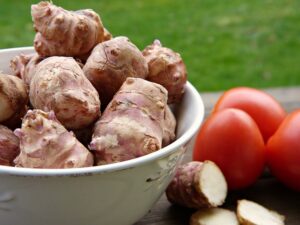Jerusalem artichokes, the under-appreciated tubers that grace the gardens of those in the know, offer a bounty of possibilities for the dedicated gardener. Often overshadowed by their more famous counterparts, the potato and the common sunflower, this peculiar plant holds its own in both historical significance and culinary potential. In this guide, I’ll take you on a fascinating gardening odyssey, from planting to plate, revealing the secrets to growing Jerusalem artichokes.
Unearthing the Historical Roots of the Jerusalem Artichoke
Before we get our hands dirty, it’s worth understanding just why Jerusalem artichokes are cultivated. Native to North America, Jerusalem artichokes—sometimes wittily referred to as ‘sunchokes’—have a rich history. Indigenous peoples recognized their value long before European settlers arrived, using them as a dietary staple and as a medicinal herb. It wasn’t until the 1600s that these tubers gained popularity in Europe, primarily in France, where they were embraced as a culinary delight.
Taking a leaf from their historical book, gardeners can appreciate the versatility and resilience of the Jerusalem artichoke, attributes that make it a valuable addition to any garden seeking sustainability and self-sufficiency. Even so, its rise to historical fame has its roots firmly in the soil, just as the sap of its stem reaches for the sun.
Why I Began Planting Jerusalem Artichokes
I first heard about Jerusalem Artichokes when I began investigating becoming more sustainable. I was looking for perennial plants that provided a reasonable amount of calories, were free of most diseases and pests, and required little care. I also wanted plants not commonly seen as a food source, so I could practice stealth food gardening. Jerusalem artichokes were not as common then, but I found some for sale online and bought a few to plant.
Planting Your Jerusalem Artichoke Empire
If you take the time to look on your next walk through a woody area, and you know what to look for, you will probably find Jerusalem Atrichokes growing wild on the woodland edges and meadows. So it is no surprise that Jerusalem Artichokes favor the wild side of your garden, thriving in loose, well-drained soil and open, sunny spaces. When preparing to plant, you can easily find seed tubers online these days or use small tubers from a previous harvest. Planting during springtime is best, as Jerusalem artichokes are frost sensitive. Just be sure you pick a place you are prepared for them to take over as they are very hard to get rid of once established.
The Sow Must Go On
When planting, choose a spot where they can stretch their roots. I recommend digging a trench around 4 to 6 inches deep, placing tubers 12 to 18 inches apart, and covering them with soil. Ensure the tubers have at least one ‘eye’ or growth point, similar to how you’d plant a potato.
Weathering the Seasons
Jerusalem artichokes are resilient—not just in the face of the seasons, but to most growing conditions. They’ll need water, but they’re not overly needy. Check your soil moisture regularly, providing more water during dry spells. Come fall, they’ll reward you with a bountiful harvest. Once established, they essentially need no care and will multiply and spread with abandon, so beware!
Harvesting the Fruits of Your Labor
The most exciting part of growing any plant is the harvest. Jerusalem artichokes are no exception, but they require a delicate hand. Harvest the tubers once the plant has died back, usually after the first frost. Cut the stems and carefully dig around the tubers to prevent damage. They’ll store best if you leave the soil clinging to the tubers, protecting them from the air.
Store Up for Winter
Jerusalem artichokes can be stored in a cool, dark place for several weeks. For longer storage, ensure they are kept in slightly moist conditions, just enough to keep the soil attached. In most Growing Zones, you can store your Jerusalem artichokes in the ground over winter, and just dig them up as needed. This makes them excellent as a winter survival food should you need one.
The Many Faces of Jerusalem Artichoke in the Kitchen
Jerusalem artichokes are a culinary chameleon, equally at home in comforting soups as in elegant salads. Their nutty, somewhat sweet flavor complements a variety of dishes and cuisines. Here’s where the adventure in the kitchen begins.

Traditional Delights
Start with simple recipes such as roasted Jerusalem artichokes or a rustic soup. Their distinctive flavor doesn’t need much to shine, making these the perfect starting point for any home cook.
Exploring New Horizons
Feeling adventurous? Try Jerusalem artichoke chips for a healthful twist on a classic snack, or incorporate them into a warm winter stew. They also transform into a silky purée that pairs well with everything, from meats to fish.
Cautions Regarding Eating Jerusalem Artichokes
Jerusalem artichokes can cause gastric upset because of their high inulin content. Cooking them slow and low will break down the inulin. A crock pot is a good way to cook Jerusalem artichokes the first time you try them. Put them on low the night before, and plan to have them for supper the following night.
Sustaining More Than You Eat
The true beauty of Jerusalem artichokes lies not only in their gastronomic appeal but in their role in our ecosystem. They are exceptional foragers of nutrients, which means they’re great for soil health. They’re also a low-maintenance crop, requiring less intervention and fewer resources than most. In a world where sustainability is key, growing Jerusalem artichokes is a simple yet effective way to tread more lightly on the earth.
Conquering Common Challenges
No gardening guide would be complete without a section on troubleshooting. Jerusalem artichokes, like all living things, can face their share of adversaries. From mildew to pests, here is a quick overview of potential issues and how to address them.
Dealing With Disease
To prevent mildew, ensure plants have good air circulation. Organic fungicides can be used as a preventative measure, but always follow instructions carefully. But once these plants are established, they are unlikely to need help.
Pest Patrol
Jerusalem artichokes are usually pest-resistant, but you may encounter slugs, which love the moist conditions these plants can provide. Try using diatomaceous earth or beer traps to keep them at bay.
The Competition
Weeds can become a nuisance in your Jerusalem artichoke patch when trying to get them established. Regular weeding and maintaining a healthy mulch layer will help keep them under control.
I found this out when I planted them in a mound in my uncultivated wild meadow-like property. I thought they would out compete anything growing there. Unfortunately, they were not able to establish themselves before being essentially crowded out by other plants.
This year, I covered the whole mound in black plastic to solarize what was there all winter. Then, before anything else had a chance to grow, I covered it in landscape fabric and used a torch to burn round holes where I planted my artichoke tubers.
They are coming up nicely, and I will just keep widening the holes around them until they take over the mound completely, providing me with an ongoing source of food that will reproduce itself year after year..
The Call to Grow Your Own
Jerusalem artichokes offer a taste of history, a glimpse into the world of sustainable gardening, and a delightful addition to any meal. With this guide, you now have the tools to cultivate your own sustainable harvest of sunchokes, from bright yellow flowers to the table.
To fellow gardening enthusiasts, peppers, and those committed to sustainable living—put on your gloves, sharpen your spades, and plant the seeds of a truly rewarding experience. The earth is calling, and the time to answer is now.
In planting a future with Jerusalem artichokes, you’re not just growing a crop. You’re nurturing the earth, cultivating resilience, and harvesting the fruits of your labor—quite literally.

